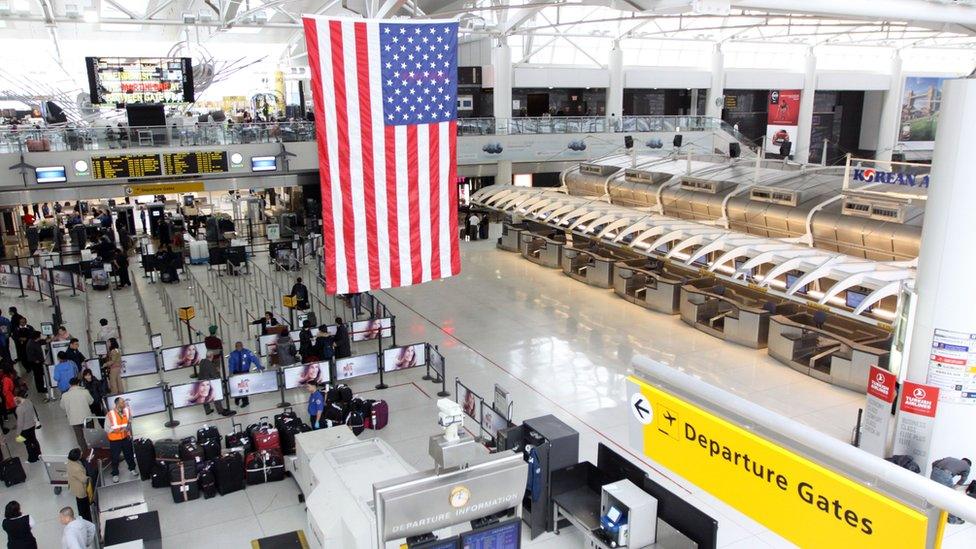Trump's first week: Well, that was intense
- Published
Trump's 'yuge' first week as president recapped
Donald Trump promised that he would deliver big things for the American people from the moment he came into office. To call his first week "yuge", as he might say, would be an understatement.
Mr Trump's first seven days in office have seen a flurry of executive orders, a war declared by his team on the mainstream media, some of the largest protests ever held in the United States, and the coining of a term - "alternative facts" - that could come to define the White House under his tenure.
The BBC website has published more than 200 stories and videos about or relating to President Trump since inauguration day.
It's been a busy week.

Day One: American carnage

In retrospect, this was the calmest day of them all.
With his hand resting on two Bibles - one his own, the other used by Abraham Lincoln in 1861 - Donald John Trump was sworn in as US President, the first man to hold the office without either political or military experience.
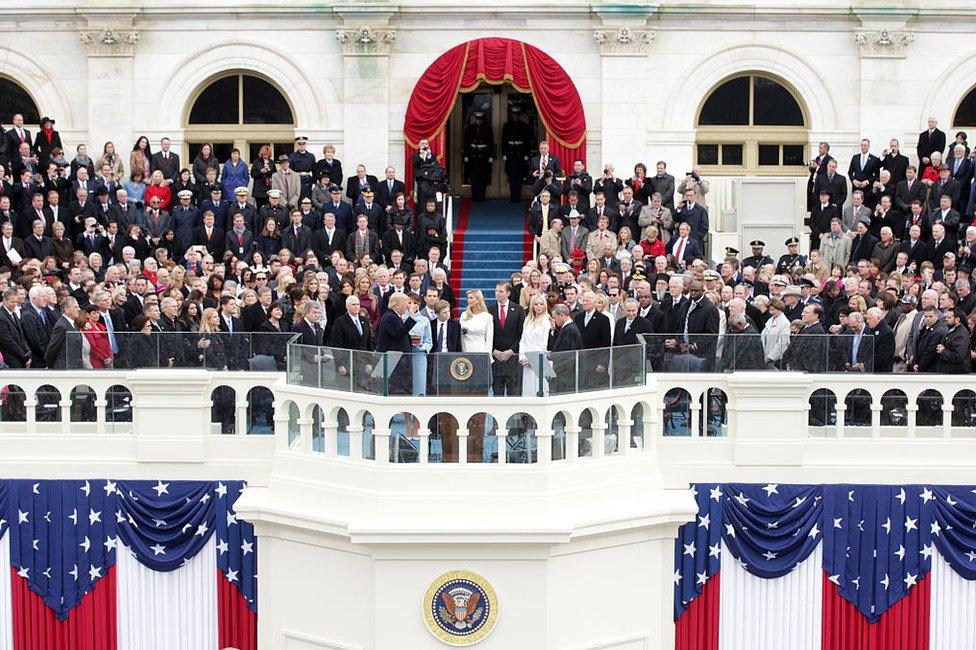
Earlier in the day, Barack Obama was captured through a window leaving a letter for his successor in the top drawer of the Oval Office desk. What did it say? We don't know and President Trump won't say.
Addressing the nation at the ceremony, President Trump spoke in fairly bleak terms of rusted-out factories, poverty-stricken families and crime-blighted cities, vowing to end "this American carnage"
Trump's inauguration: Story of the day
"This was not a message to the American people as a whole - many of whom likely feel the past resident of the White House, Barack Obama, reflected their beliefs and their diversity," our correspondent Anthony Zurcher wrote.
"This was a speech for the angry, the frustrated, the American voters who turned out in places like Pennsylvania, Michigan, Florida and Ohio to shake their fist at the status quo and take a chance on a man who was unlike any presidential politician who came before him."
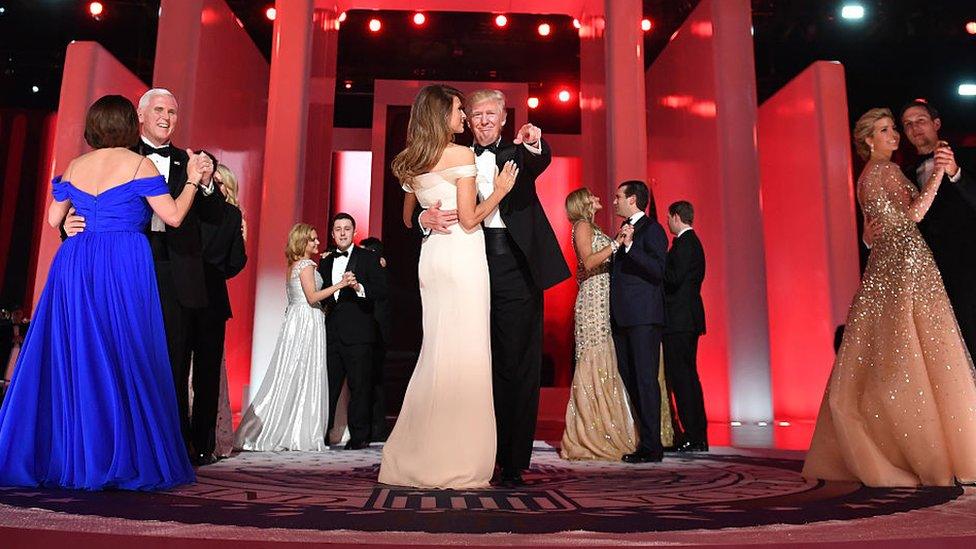
As the Obamas left for a holiday in Palm Springs, a new era in politics began. Take a deep breath now...

Day Two: My crowd's bigger than your crowd

While many protests were held on inauguration day around the world, including one in Washington that spiralled into violence, Saturday 21 January saw a remarkable global expression of opposition to the Trump administration and its perceived world view.
Millions of people turned out to demonstrate at "Women's Marches" in cities around the world to make their voice heard on women's reproductive rights, gender, sexual and racial equality.
Five countries where anti-Donald Trump protests took place
But as protests continued, President Trump gave an extraordinary press conference at the CIA headquarters, telling staff that the media had fabricated a "feud" between him and the intelligence agencies, despite previously tweeting, external they were acting as if the US was Nazi Germany.
Standing in front of the CIA's hallowed memorial wall, which honours agency employees who died in service, he also complained about reporting of the crowd size at his inauguration, and unflattering comparisons to the turn-out at Barack Obama's own ceremony in 2009.
What followed saw "post-truth" politics kick into high gear.
Trump dispatched his combative new press secretary Sean Spicer to lambast the media in a televised briefing.
He said no-one had any crowd estimates from the inauguration before then giving his own crowd numbers - saying that the space holding 720,000 people was full when the oath was taken. This, he claimed, "was the largest audience to witness an inauguration, period. Both in person and around the globe".
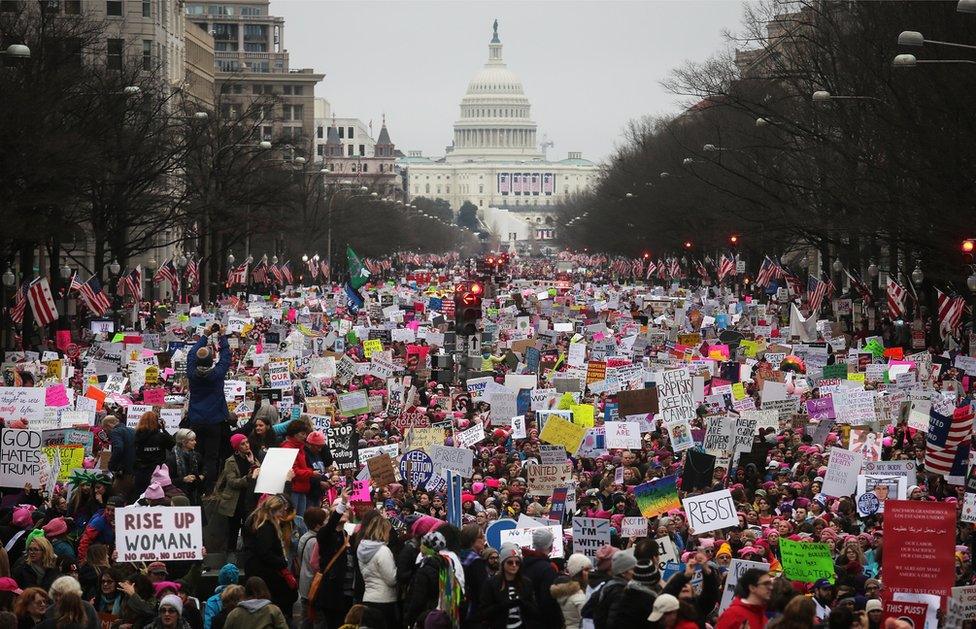
Officials in Washington say up to half a million demonstrators joined the Women's March there
He also falsely said the number of people taking Washington's subway system on the day had been higher than during Barack Obama's second inauguration in 2013.

Day Three: A fact is no longer a fact. And that's a fact.

In a television interview on Sunday, Trump counsellor Kellyanne Conway defended Spicer's inaccurate claims, thereby introducing the world to the term "alternative facts", which is how she described what he said.
"Alternative facts are not facts. They are falsehoods," NBC presenter Chuck Todd replied.
The internet, of course, delivered an outpouring of #Spicerfacts.
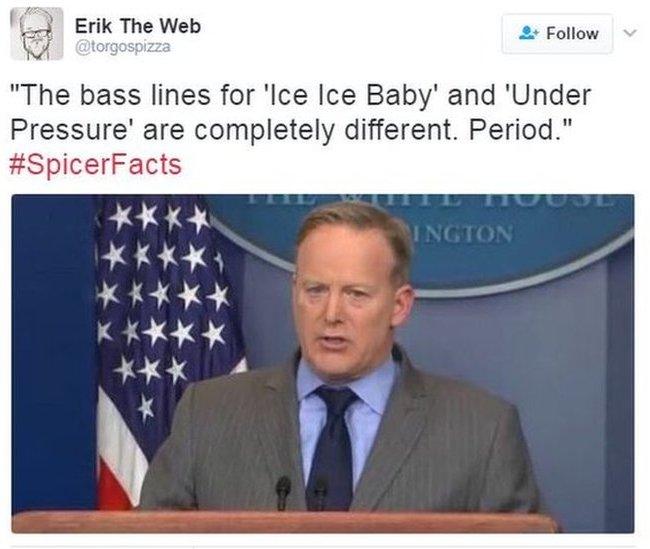
Meanwhile, the president himself was praising Barack Obama at a ceremony to swear in senior members of his team.
President Trump reveals that Barack Obama left him a "beautiful" letter at the Oval Office
While there, he said he would soon begin negotiating the North American Free Trade Agreement (Nafta) with his Canadian and Mexican counterparts.
"Mexico has been terrific. The president has been really very amazing," he said.
More on Mexico was to come later in the week from the president. (Hint: They stopped being so amazing.)
Trump also finally responded to Saturday's mass protests against him.


Day Four: It's business time

The first working day of the Trump administration kicked off with meeting between the president and business leaders, during which Trump announced his aim to cut regulations for US-based businesses by 75%.
A clutch of executive actions followed. He pulled the US out of the 12-nation Trans-Pacific Partnership trade deal, a key part of Obama's efforts to engage and divert attention to the Asia-Pacific. Australia swiftly said it wanted to try to keep the deal alive with a so-called 'TPP 12 minus one'.
Donald Trump had a busy first working day as president
Trump also banned federal money going to international groups which perform or provide information on abortions.
The US president's order shows he "wants to stand up for all Americans, including the unborn," his press secretary Sean Spicer said.
This picture went viral.
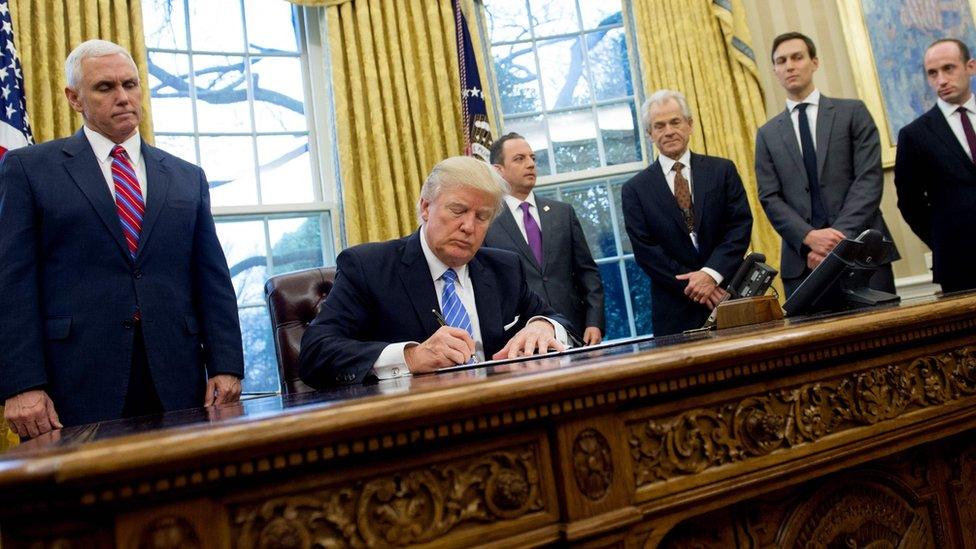
Spot the women
"As long as you live you'll never see a photograph of 7 women signing legislation about what men can do with their reproductive organs," Guardian social editor Martin Belam said on Twitter. More than 260,000 people re-tweeted his thoughts.
If the day wasn't busy enough in Trump news, a group of US ethics lawyers had filed a lawsuit against the president, alleging he is violating a constitutional ban on accepting payments from foreign governments through his hotels.
Mr Trump described the lawsuit as "totally without merit".
Oh, and he implemented a hiring freeze on some federal government workers.

Day Five: Mmmm, oil

The barrage of executive actions continued on Tuesday, with two orders signed to back controversial oil pipelines - Keystone XL and the Dakota Access project - if American steel is used.
The Standing Rock Sioux Tribe, whose land abuts the proposed route of the Dakota Access pipeline, called Mr Trump's decision a violation of "law and tribal treaties".

US pipeline protesters: 'It's going to be war'
Environmentalists said Trump was proving as dangerous to the climate as they had feared. Oil industry groups applauded.
Separately, Sean Spicer sparred again with reporters, this time over Trump's claims that millions of illegal voters cast ballots in the election despite no evidence suggesting so.
Sean Spicer: "The president has believed this for a long time"
It was also announced the FBI Director James Comey would stay in his position under the Trump administration.
Mr Comey, of course, is blamed by many Democrats for Hillary Clinton's election loss. He announced the FBI was looking into new Clinton emails just days before the election, before soon after saying it found no evidence of criminality.
Just a reminder: it's only Tuesday.

Day Six: When torture became OK

A visit to the Department of Homeland Security saw two more executive orders signed. One calls for "a large physical barrier" - the infamous wall - to be built on the US's southern border.
The other toughened policy on illegal immigrants -"aliens" - including by withholding funding from so-called "sanctuary cities" that protect undocumented immigrants within their boundaries.
In an interview with ABC News that aired on Wednesday evening, Trump said he believed waterboarding works, stating "we have to fight fire with fire".
But Mr Trump also said he would consult Defence Secretary James Mattis and CIA director Mike Pompeo - both of whom have indicated they oppose the method - and "if they don't want to do it that's fine".
Donald Trump tells ABC News that "torture works"
A draft executive order - that the Trump team disavows as a White House document - also surfaces. It calls for a review into whether the "black sites" programme should be reintroduced and would scrap Mr Obama's move to close the detention facility at Guantanamo Bay in Cuba.
Another draft executive order emerges suggesting Trump would suspend the Syrian refugee programme and stop issuing visas from several Muslim-majority countries deemed to pose a threat to the security of the US.
White House officials declined to comment on the document.
Which countries might be subject to Trump ban?
But hey, it's almost the weekend.

And on the seventh day, Donald annoyed Mexico

Plans for an upcoming meeting between Mexican President Enrique Pena Nieto and Donald Trump fall apart after the US President insists Mexico must pay for the border wall.
President Enrique Pena Nieto rejects Donald Trump's call for Mexico to pay for a border wall
Mr Pena Nieto cancels the meeting after Trump says it would better not be held if Mexico refuses to cough up.
The White House then suggests a new 20 percent tax on Mexican imports could fund the barrier, but this is rubbished by Mexico's Foreign Minister Luis Videgaray, who says that such a move would only shift the costs burden onto US consumers.
While the US-Mexico drama unfolds, UK Prime Minister Theresa May arrives in the US, joking that "opposites attract" and saying she wants to "renew the special relationship" between the UK and America.
Separately, former US Secretary of State Madeleine Albright vows to register as Muslim if Trump creates a register of Muslim-Americans.

Day Eight: The British are coming!

On Friday morning, CNN hosted Gregg Phillips, a conspiracy theorist who has repeatedly said millions of people vote illegally in the US, and has just as often declined to provide any evidence whatsoever for that claim.
Forty-two minutes later, Trump tweeted his support, external for Phillips.
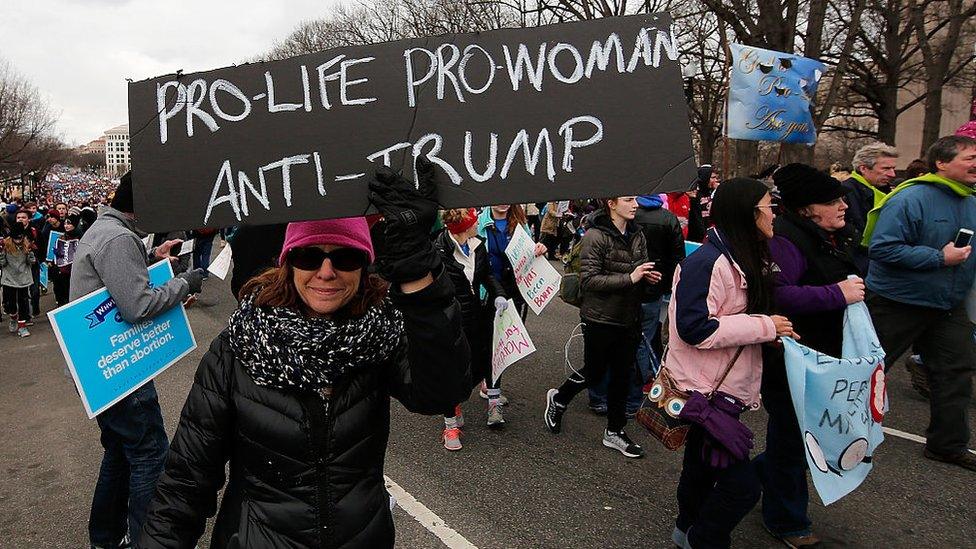
Thousands of people marched on Washington to protest against abortion, and Vice-President Pence became the first sitting VP to address the demonstrators, saying, "Life is winning in America."
Amid rumours that he would lift sanctions on Russia, Mr Trump hosted his first international leader when British Prime Minister Theresa May came to visit. Mr Trump joked about revoking the "special relationship" after the BBC asked him a pointed question about his stance on abortion, torture and other hot topics.
President Trump joked about the special relationship with the UK after the BBC's political editor's question
Just before close of business, he attended the swearing-in ceremony for James Mattis as Secretary of Defense. There, he announced two new executive orders: one ordering "new ships, planes, resources and tools" to build up the military, and one creating new vetting measures to combat radical Islamic terrorism.
"We only want to admit into America those who support our country and love deeply our people," he said.
Have a relaxing weekend, everyone!
- Published10 September 2024
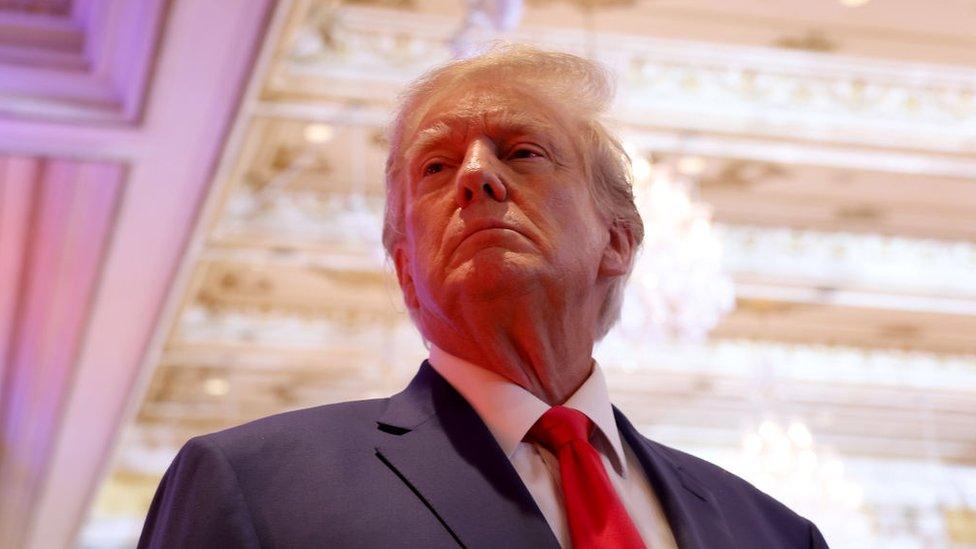
- Published25 April 2017
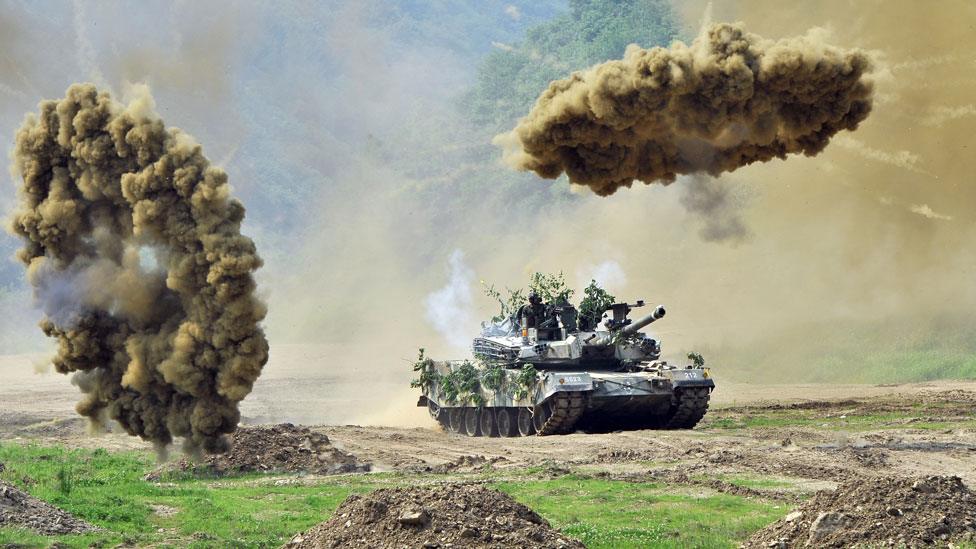
- Published12 April 2017
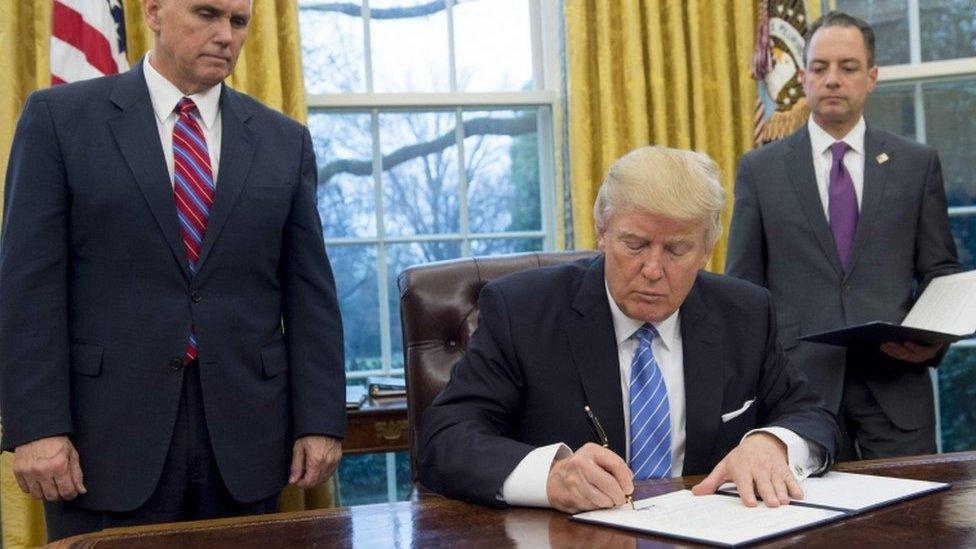
- Published21 January 2017
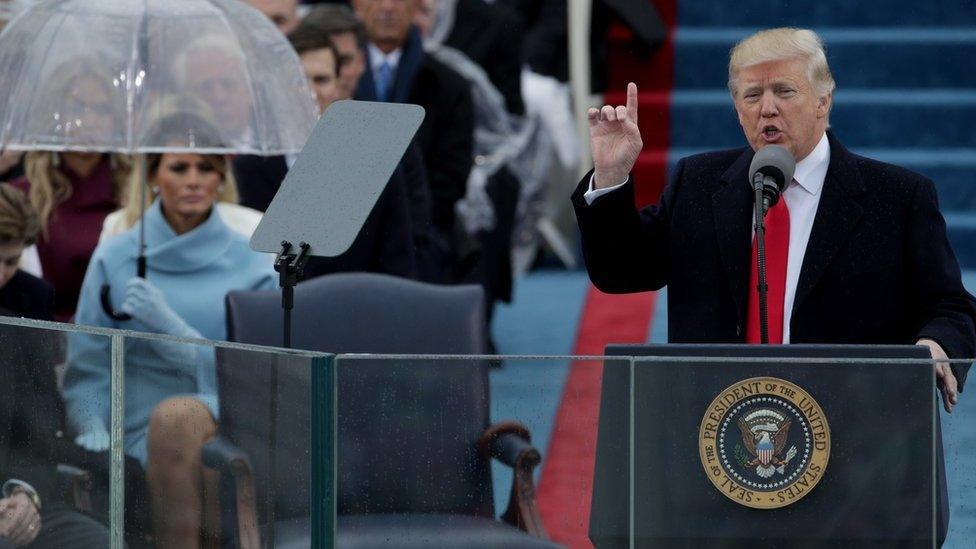
- Published26 January 2017
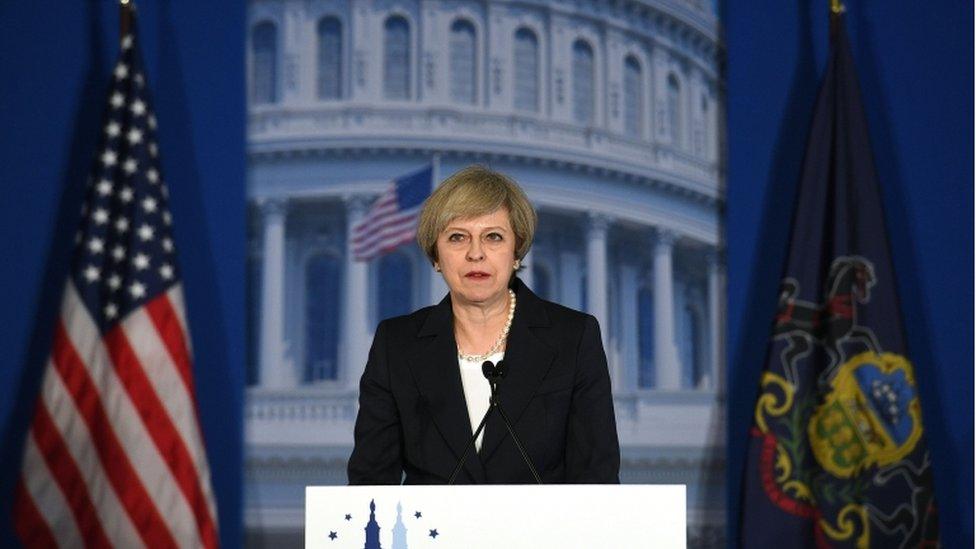
- Published27 January 2017
